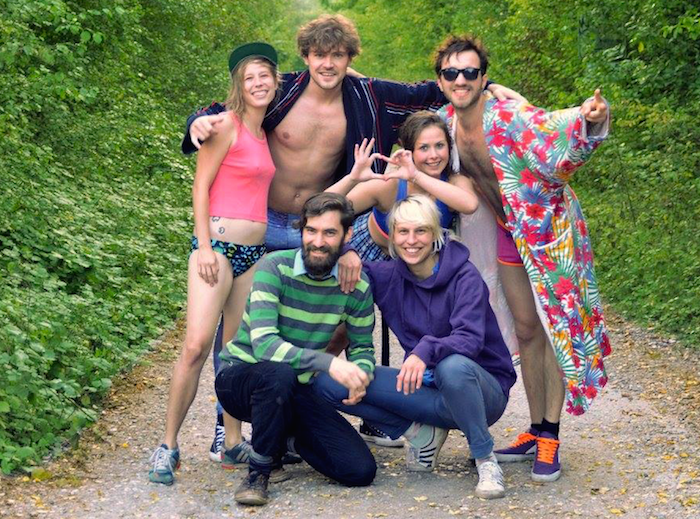FRIENDS WITH BENEFITS: THE MAIKE BROCHHAUS INTERVIEW.
 Sunday, March 13, 2016 at 3:02PM
Sunday, March 13, 2016 at 3:02PM For Maike Brochhaus, sexuality in cinema is due for some redefining. An advocate of pro-sex feminism who lectures on the role of pornography in art history, the German filmmaker has directed a contemporary sex comedy called Schnick Schnack Schnuck (the title a Teutonic variation of ‘Scissors Paper Rock’). In the frank and fearless film, a group of 20-something friends deal with life and love while frequently indulging in what 20-somethings do best; the sex is full penetration, the scenarios designed to convey character and drive plot but also question the nature of audience reaction. Brochhaus seems to have tapped into a groundswell of like-minded support for real-world/real-people sex within a conventional narrative. In 2015, she won the prestigious Best Director honour at Berlin’s PornFilmFestival; last week, Schnick Schnack Schnuck won the Audience Award at the Kinky Film Festival in New York City. From her base in the city district of Kalk in Cologne, Maike Brochhaus spoke to SCREEN-SPACE about the daunting mission she faces in changing the contemporary view of sex on film….

(Pictured, above; front row - producer Sören Störung and Brochhaus, with cast members)
SCREEN-SPACE: What did you set out to achieve with Schnick Schnack Schnuck?
Brochhaus: Sören (Störung, producer) and I always liked those classic 70s porn flicks. They are fun to watch, with great music, a little naive and silly but still kind of hot and honest. After watching a lot of them, with Sören or a couple of girlfriends or at the PornFilmFestival in Berlin, we started asking ourselves, ‘Why don't they make 'em like that anymore?’ So we decided to do something about it. Most of the 70s humour was plain sexist, which can be fun if you look at it now because it's so old, but we didn't want that in our film. So we tried to find a way to capture the spirit but with a fresh, modern feel to it.
 SCREEN-SPACE: There is a compelling honesty about the sex your camera captures. Why do you think the sensation of watching your actors have sex is very different from the reaction one experiences with ‘mainstream’ pornography?
SCREEN-SPACE: There is a compelling honesty about the sex your camera captures. Why do you think the sensation of watching your actors have sex is very different from the reaction one experiences with ‘mainstream’ pornography?
Brochhaus (pictured, right): Back in 2013, I crowd-funded a documentary called häppchenweise, in which six real people around the age of 30 get drunk and play spin-the-bottle. I wanted to see if they would have sex in front of the camera without forcing them. I called it a "post-pornographic experiment". We ended up with one shy and very harmless sex-scene, which I really liked. It was so honest! Schnick Schnack Schnuck is the first scripted film we’ve made, and I wanted to have amateur actors in unscripted sex scenes as well. The situations leading to sex were of course scripted, but not the actual sex. We just let them do whatever they liked for how long they wanted. This comes with some risks, because you never know what's going to happen, but I'm very happy with the result.
SCREEN-SPACE: Another point of difference is the range of sexual acts that your cast presented you with. Is the willingness to experiment with the sexual experience common to the generation represented in the film?
Brochhaus: I know women and men who live deliberately adventurous and/or promiscuous lives. They talk openly about their desires, experiences and problems, which is a very healthy thing. I wanted to show a little of that in a happy and relaxed way. But there are also friends of mine feeling very insecure about themselves, their bodies and sex in general. And I feel like mainstream porn is not helping at all. In fact, it can lead to a lot of pressure. So in Schnick Schnack Schnuck, you don't get to see muscular androids working out, just some slightly hairy people having fun.
 SCREEN-SPACE: What exactly is the director’s role when staging such intimate moments? What techniques do you apply when shooting sex scenes?
SCREEN-SPACE: What exactly is the director’s role when staging such intimate moments? What techniques do you apply when shooting sex scenes?
Brochhaus: We essentially came up with three simple rules - show individuals rather than just interacting bodies; show real female pleasure; and, don't be afraid of a flaccid penis. We shot the sex scenes with two cameras, a sound guy, the performers and I. We talked about what they would and would not like to do during the shoot and I asked them if I'm allowed to give them some simple directives, like move an arm a little or stuff like that. (Pictured, above; Brochhaus on-set, with Störung)
SCREEN-SPACE: I love the film's notion of ‘Pornotopia’! A world in which sex exists unburdened by any negative connotations or social stigma; where it just ‘is’, like in a porn film. Can such a state of being ever really exist?
Brochhaus: Unfortunately, I don't think so. That's why I want to remind the viewers that they are still watching a porn flick. In Pornotopia, sex is always an answer and able to solve all kinds of complex problems. In reality you have to deal with so many more things. It couldn't hurt if we ease up a little, though.
 SCREEN-SPACE: In broader terms, why is there not a film genre that allows for the frank portrayal of real sex within a conventional narrative? Why do you think that, despite films like Shortbus and 9 Songs, actual sex in mainstream plots remains a taboo?
SCREEN-SPACE: In broader terms, why is there not a film genre that allows for the frank portrayal of real sex within a conventional narrative? Why do you think that, despite films like Shortbus and 9 Songs, actual sex in mainstream plots remains a taboo?
Brochhaus: This is a question I could talk about for hours. I think part of it comes from our Christian background, which always tabooed sex for pleasure. Its influence is getting weaker, but it's still powerful. Sex remains something a lot of people don't like to watch, especially with other people in a cinema. I always find it strange that fighting and killing seems to make people much less uncomfortable than sex and dealing with emotions. Another big thing is obviously sexism. Over centuries there were men trying to restrict female sexual development because they were afraid of it. Pornography was created by men for men; women were only tools for their pleasure. Nowadays, there are even women who have adapted to this all-male view on sex, and that needs to be changed. And I'm happy it is changing right now! You can feel enormous fear if you read anonymous men commenting online on feminism and women commenting on pornography. There is part of men who are deeply afraid of dealing with female pleasure but there's no need to be afraid. Men and women think a lot about sex, that's a fact, and I think we should talk about it. I don't think it's healthy for an individual nor for society to suppress it or let mainstream-porn and advertising tell us how we have to do it. So let's put real sex back into film and enjoy it! (Pictured, above; leads Jana Sue Zuckerberg, as Emmi, and Felix Anderson, as Felix)
Watch the trailer here (NSFW Warning - Explicit Sexual Content)
 Comedy,
Comedy,  Contemporary,
Contemporary,  German,
German,  Pornography,
Pornography,  Sex in Film
Sex in Film 
Reader Comments